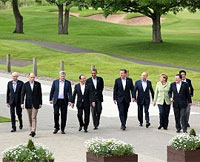Russian Pundits Arbatov And Karaganov Upbeat On G8 Summit Results

(RIA Novosti – Moscow, June 19, 2013) The results of the G8 summit, which was held on Monday and Tuesday (17-18 June) in the Northern Irish resort of Lough Erne, despite the absence of global agreements, are generally positive, primarily thanks to the fact that it was possible to avert a serious rift between Russia and the seven remaining members of the forum over how the situation in Syria should be settled, experts believe.
“The talks on Syria, to which so much attention was paid, can be considered a success. It was thought that they would all quarrel with each other, call off the Geneva conference, and would not even adopt a joint communique. Or even worse, the G7 would adopt a communique, but Russia would proudly walk out and say that it disagrees. It proved possible to avert that. They adopted a joint communique of the most amorphous nature, with good intentions. I think that this summit will go down in history as one at which it proved possible to avert a profound rift between Russia and the seven remaining members of that forum,” Aleksey Arbatov, an academician at the Russian Academy of Sciences, told RIA Novosti.
In the opinion of political analyst Sergey Karaganov, the dean of the world economics and world politics department at the Higher School of Economics national research university, Russian President Vladimir Putin’s different position on the Syrian issue not just demonstrated that Russia is capable of taking punches, but also turned out to be beneficial for everybody. “If Russia had turned (Syrian President Bashar) al-Asad in, we would have got, instead of secular Al-Asad, a civil war and the domination of Al-Qa’idah, which would have been another spit in the West’s face, just as the so-called victory in Libya was a spit in the face,” Karaganov said.
Resumption of contacts (source subheading)
Previous G8 summits approved grand projects, such as, for example, the global partnership for the prevention of the nuclear threat (Global Partnership Against the Spread of Weapons and Materials of Mass Destruction), under which large sums were allocated and spent on all things concerning the security of nuclear materials and technologies, Arbatov recalled.
“That is in fact what the G8 became famous and went down in history for. At the current summit, many events and contacts were planned. This is generally the resumption of things that were interrupted, including the Nunn-Lugar (Cooperative Threat Reduction) Programme, which, it was decided, would continue. It is a positive step – the resumption of interrupted contacts at various levels, including meetings in the format of foreign and defence ministers, including the resumption of contacts at the level of the Russian prime minister and the US vice-president. All of these are positive shifts, but they should not be overestimated. This is a little step towards returning to the level of cooperation that existed earlier,” the expert said.
Cyber security initiatives (source subheading)
Among the G8’s new initiatives, the experts noted proposals concerning cyber security and the speedy sharing of information in emergencies.
In Karaganov’s opinion, due to the new wave of the technological revolution, many security parameters are changing.
“Cyber attacks may become in some way similar to weapons of mass destruction. Once one country, groups of countries or even third players are capable of bringing down the economy in that way, it will mean mass casualties among civilians and the collapse of modern society,” said Karaganov, who cited the example of China, where some specialists have seriously been discussing the use of a massive cyber attack as a method of deterring a possible attack by the USA.
“We are entering a completely new world, which we do not fully know or understand. That is why the agreement between Putin and Obama on confidence measures in cyberspace may bring us closer to being capable of deterring attacks at least by third players or dealing with their consequences,” Karaganov is convinced.
However, these agreements, as well as the proposals for the speedy sharing of information in emergencies, have largely symbolic significance at present, the experts believe.
“It sounds good, but it is not yet clear what specifically this will lead to. Of course, cooperation against terrorism is an important area, but everything is classified there, so we do not know whether there will be more or less cooperation there,” Arbatov said.
